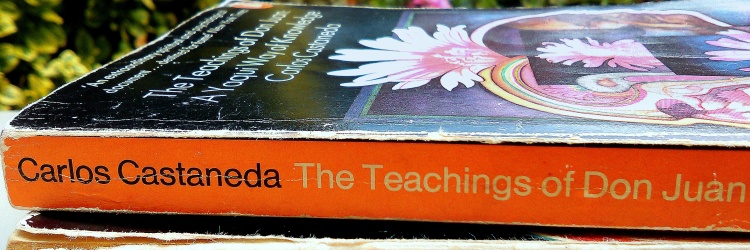It seems that most often in life it is not the most expensive or sought after things which fulfill us, but the smallest and unexpected. The worn and unassuming paperback, The Teachings of Don Juan by Carlos Castaneda, hidden at the bottom of a Book-Cycle donations box was certainly unexpected. My eyes were immediately drawn by its beautiful cover; an illustration by Wilson McLean. Two faces are interlinked, joined by a rainbow, one representing the internal body, its brain a flower laced with the spectrum of the rainbow, the other simply a seemingly ordinary man.
I had never heard of Carlos Castaneda before (despite The Teachings being first published in 1968) and opened the book at random. It was not like anything I had ever read before; a heady, frank account of an entirely unfamiliar philosophy. As I was flipping through it, another volunteer spotted what I was reading, exclaiming, ‘That book changed my life -’ although she then hurriedly admitted, ‘but perhaps you might not learn anything from it’. Challenge accepted.
This book would be easy to simply disregard as meaningless fantasy. In fact, there is debate as to whether the content of Castaneda’s work is fact (having been originally published as non-fiction) or fiction. Admittedly, the debate seems to be leaning towards the side of fiction. However, to argue either way about the validity of the book’s content seems to me to miss the true value of the text. As does hiding it away within the restricting category of ‘New Age’, in which some may be tempted to confine it. Regardless, be it fact or fabrication, Castaneda’s writing will pull you in: either he has one fantastically crazy imagination, or he has recorded a refreshingly unique way of perceiving and interacting with the world.
For me there is only the traveling on the paths that have a heart, on any path that may have a heart. There I travel, and the only worthwhile challenge for me is to traverse its full length. And there I travel–looking, looking, breathlessly.
The text follows Castaneda’s journey to become a Man of Knowledge. What begins as a simple desire to study peyote (a hallucinogenic drug) turns into encountering the god of peyote, Mescalito, and learning how to use jimson weed and humito mushrooms to discover a new way of ‘seeing’. However, The Teachings is not all hallucinogen-fueled experiences and philosophical revelations. Castaneda offers a lively, vivid portrayal of his relationship with Don Juan, an inevitably likable and endlessly interesting man, as well as Castaneda’s spiritual teacher. The text follows Castaneda’s supposed experiences during his explorations into shamanism, with many nuggets of insight along the way that have a striking relevance to our own everyday life.
Before you embark on any path ask the question: Does this path have a heart? If the answer is no, you will know it, and then you must choose another path. The trouble is nobody asks the question; and when a man finally realises that he has taken a path without a heart, the path is ready to kill him. At that point very few men can stop to deliberate, and leave the path. A path without a heart is never enjoyable. You have to work hard even to take it. On the other hand, a path with heart is easy; it does not make you work at liking it.
(However, it’s worth noting that there are a few dozen or so detailed descriptions of ritual preparations to pick through, which may not be to everyone’s tastes.)
Needless to say, I ended up leaving Book-Cycle with both The Teachings and its sequel in hand. Now, having read them both, I will be keeping an eye out for more of the series. If you are looking for something a bit different to read, this is a psychedlic and intriguing escape from the mundane. More than that, if you approach it with an open mind, Castaneda’s writing allows you to explore a new way of perceiving the world around you. At the very least, you will be left wanting to read more about the mysterious Don Juan and his philosophy.
